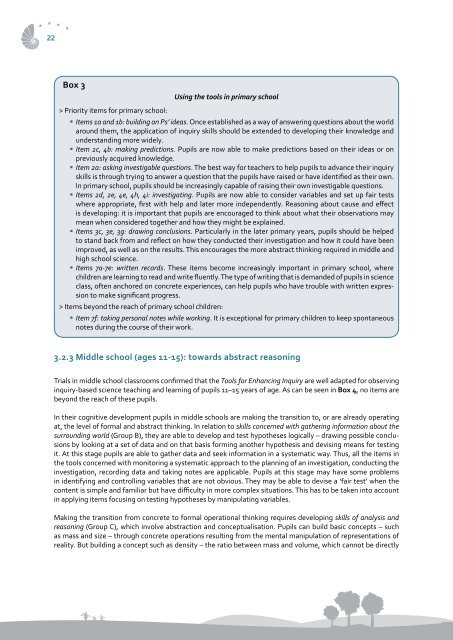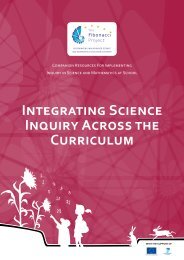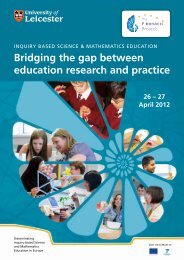Tools for Enhancing Inquiry in Science Education - Fibonacci-Project
Tools for Enhancing Inquiry in Science Education - Fibonacci-Project
Tools for Enhancing Inquiry in Science Education - Fibonacci-Project
You also want an ePaper? Increase the reach of your titles
YUMPU automatically turns print PDFs into web optimized ePapers that Google loves.
2223Box 3Us<strong>in</strong>g the tools <strong>in</strong> primary school> Priority items <strong>for</strong> primary school:• Items 1a and 1b: build<strong>in</strong>g on Ps’ ideas. Once established as a way of answer<strong>in</strong>g questions about the worldaround them, the application of <strong>in</strong>quiry skills should be extended to develop<strong>in</strong>g their knowledge andunderstand<strong>in</strong>g more widely.• Item 2c, 4b: mak<strong>in</strong>g predictions. Pupils are now able to make predictions based on their ideas or onpreviously acquired knowledge.• Item 2a: ask<strong>in</strong>g <strong>in</strong>vestigable questions. The best way <strong>for</strong> teachers to help pupils to advance their <strong>in</strong>quiryskills is through try<strong>in</strong>g to answer a question that the pupils have raised or have identified as their own.In primary school, pupils should be <strong>in</strong>creas<strong>in</strong>gly capable of rais<strong>in</strong>g their own <strong>in</strong>vestigable questions.• Items 2d, 2e, 4e, 4h, 4i: <strong>in</strong>vestigat<strong>in</strong>g. Pupils are now able to consider variables and set up fair testswhere appropriate, first with help and later more <strong>in</strong>dependently. Reason<strong>in</strong>g about cause and effectis develop<strong>in</strong>g: it is important that pupils are encouraged to th<strong>in</strong>k about what their observations maymean when considered together and how they might be expla<strong>in</strong>ed.• Items 3c, 3e, 3g: draw<strong>in</strong>g conclusions. Particularly <strong>in</strong> the later primary years, pupils should be helpedto stand back from and reflect on how they conducted their <strong>in</strong>vestigation and how it could have beenimproved, as well as on the results. This encourages the more abstract th<strong>in</strong>k<strong>in</strong>g required <strong>in</strong> middle andhigh school science.• Items 7a-7e: written records. These items become <strong>in</strong>creas<strong>in</strong>gly important <strong>in</strong> primary school, wherechildren are learn<strong>in</strong>g to read and write fluently. The type of writ<strong>in</strong>g that is demanded of pupils <strong>in</strong> scienceclass, often anchored on concrete experiences, can help pupils who have trouble with written expressionto make significant progress.> Items beyond the reach of primary school children:• Item 7f: tak<strong>in</strong>g personal notes while work<strong>in</strong>g. It is exceptional <strong>for</strong> primary children to keep spontaneousnotes dur<strong>in</strong>g the course of their work.3.2.3 Middle school (ages 11-15): towards abstract reason<strong>in</strong>gTrials <strong>in</strong> middle school classrooms confirmed that the <strong>Tools</strong> <strong>for</strong> <strong>Enhanc<strong>in</strong>g</strong> <strong>Inquiry</strong> are well adapted <strong>for</strong> observ<strong>in</strong>g<strong>in</strong>quiry-based science teach<strong>in</strong>g and learn<strong>in</strong>g of pupils 11–15 years of age. As can be seen <strong>in</strong> Box 4, no items arebeyond the reach of these pupils.observed – requires some degree of <strong>for</strong>mal th<strong>in</strong>k<strong>in</strong>g, that is, the ability to mentally manipulate concepts to <strong>for</strong>mmore abstract concepts. In order to achieve this, pupils must make a transition from thought stimulated byconcrete objects to thought stimulated by abstraction.In the process of conceptual construction, language takes on a function that extends beyond simple communication:it is the very basis of abstraction. Thus, skills concerned with communicat<strong>in</strong>g (Group D) are crucial <strong>in</strong> theprocess of concept <strong>for</strong>mation. Teachers should give pupils enough opportunity to practise and develop talk<strong>in</strong>gand writ<strong>in</strong>g skills (<strong>in</strong>clud<strong>in</strong>g tak<strong>in</strong>g personal notes), which require the clarification of mean<strong>in</strong>g.Items that promote abstract reason<strong>in</strong>g (see Box 4) are thus a priority <strong>in</strong> middle school. <strong>Inquiry</strong> at this stageshould favour conceptual construction, and pupils should be encouraged to reason at a more abstract levelthan they do dur<strong>in</strong>g their primary school years. However, pupils’ skills at this level strongly depend on previousexperience – that is, the amount and quality of <strong>in</strong>quiry-based teach<strong>in</strong>g and basic skills that pupils have receiveddur<strong>in</strong>g their previous years of school<strong>in</strong>g. If pupils have had either no experience or only limited experience with<strong>in</strong>quiry be<strong>for</strong>e reach<strong>in</strong>g middle school, then emphasis has to be put on items describ<strong>in</strong>g activities and skillsrecommended as essential to ga<strong>in</strong> at the primary level, as discussed <strong>in</strong> the previous section.Box 4Us<strong>in</strong>g the tools <strong>in</strong> middle school> Priority items <strong>for</strong> middle school:Items that promote abstract reason<strong>in</strong>g and conceptual construction are particularly important <strong>in</strong> middleschool:• Item 3c, test<strong>in</strong>g predictions• Items 3a, 3b, 3e, 3f, 3g, 4h, draw<strong>in</strong>g conclusions• Items 3d, 4i: expla<strong>in</strong><strong>in</strong>g• Items 4i, 5b, 5e: argu<strong>in</strong>g• Items 2f, 3e, 3f, 3g: evaluat<strong>in</strong>g• Items 7a-7f: writ<strong>in</strong>gNevertheless, practises are very heterogeneous at this level of school<strong>in</strong>g. Priority items depend ma<strong>in</strong>ly onthe amount and quality of <strong>in</strong>quiry-based teach<strong>in</strong>g that pupils received dur<strong>in</strong>g their past years of school<strong>in</strong>g,as well as on their mastery of basic skills.> Items beyond the reach of middle school children:No items of the tools were found to be beyond the reach of middle school children.In their cognitive development pupils <strong>in</strong> middle schools are mak<strong>in</strong>g the transition to, or are already operat<strong>in</strong>gat, the level of <strong>for</strong>mal and abstract th<strong>in</strong>k<strong>in</strong>g. In relation to skills concerned with gather<strong>in</strong>g <strong>in</strong><strong>for</strong>mation about thesurround<strong>in</strong>g world (Group B), they are able to develop and test hypotheses logically – draw<strong>in</strong>g possible conclusionsby look<strong>in</strong>g at a set of data and on that basis <strong>for</strong>m<strong>in</strong>g another hypothesis and devis<strong>in</strong>g means <strong>for</strong> test<strong>in</strong>git. At this stage pupils are able to gather data and seek <strong>in</strong><strong>for</strong>mation <strong>in</strong> a systematic way. Thus, all the items <strong>in</strong>the tools concerned with monitor<strong>in</strong>g a systematic approach to the plann<strong>in</strong>g of an <strong>in</strong>vestigation, conduct<strong>in</strong>g the<strong>in</strong>vestigation, record<strong>in</strong>g data and tak<strong>in</strong>g notes are applicable. Pupils at this stage may have some problems<strong>in</strong> identify<strong>in</strong>g and controll<strong>in</strong>g variables that are not obvious. They may be able to devise a ‘fair test’ when thecontent is simple and familiar but have difficulty <strong>in</strong> more complex situations. This has to be taken <strong>in</strong>to account<strong>in</strong> apply<strong>in</strong>g items focus<strong>in</strong>g on test<strong>in</strong>g hypotheses by manipulat<strong>in</strong>g variables.Mak<strong>in</strong>g the transition from concrete to <strong>for</strong>mal operational th<strong>in</strong>k<strong>in</strong>g requires develop<strong>in</strong>g skills of analysis andreason<strong>in</strong>g (Group C), which <strong>in</strong>volve abstraction and conceptualisation. Pupils can build basic concepts – suchas mass and size – through concrete operations result<strong>in</strong>g from the mental manipulation of representations ofreality. But build<strong>in</strong>g a concept such as density – the ratio between mass and volume, which cannot be directly




